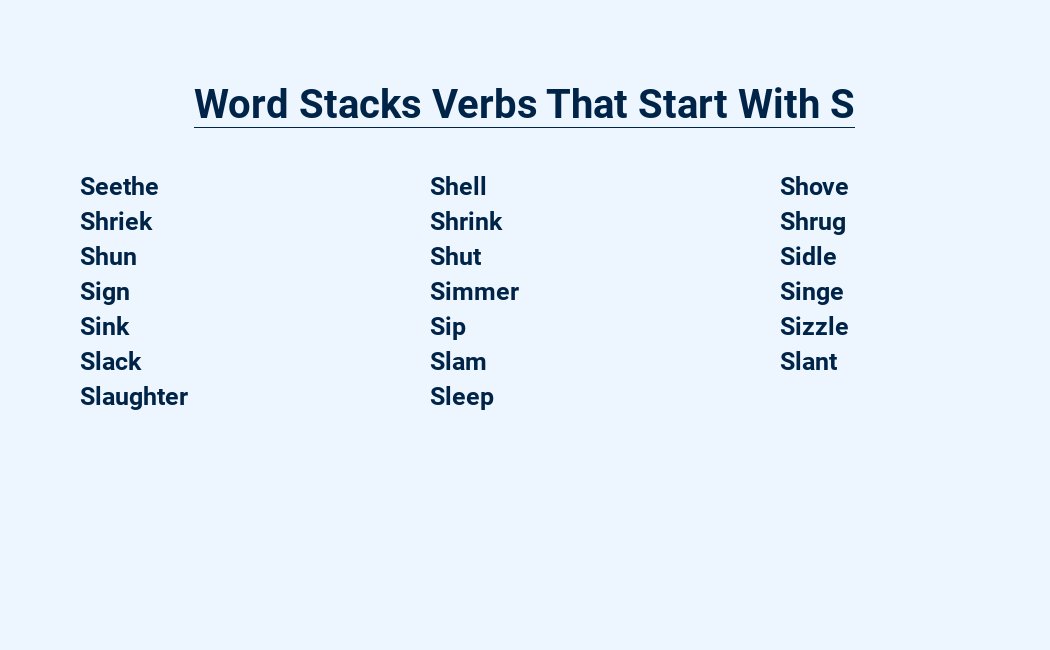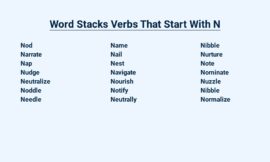Embark on a linguistic expedition as we delve into the realm of verbs beginning with “S”.
From saving, searching, and separating to serving, setting, settling, and sharing, these verbs paint a vibrant tapestry of actions and emotions.
Discover their nuances and expand your vocabulary.
| Word Stacks – Verbs that Start with “S” | ||
| Verb | Definition | Examples |
| Sanctify | To make or declare holy | – He tried to sanctify the name of God. |
| Satisfy | To fulfill a desire or need | – She was only satisfied after eating the entire pizza. |
| Scatter | To spread or distribute widely | – The wind scattered the leaves all over the yard. |
| Scold | To criticize or reprimand sharply | – The teacher scolded the student for being late. |
| Scream | To make a loud, sharp cry | – She screamed cuando she saw the snake. |
| Secure | To make safe or certain | – The soldiers secured the perimeter of the camp. |
| See | To perceive with the eyes | – I can see the mountains from my window. |
| Seek | To try to find or obtain | – She was seeking a new job. |
| Seize | To take or capture suddenly | – The police seized the drugs from the dealer. |
| Separate | To divide or set apart | – She separated the clothes into whites and colors before washing them. |
Satisfy: To fulfill a desire, need, or expectation.
Scatter: To spread or distribute something in an irregular or haphazard manner.
Scramble: To move quickly and confusedly; to struggle.
Scream: To make a loud, piercing cry, typically in fear, pain, or excitement.
Scribble: To write or draw quickly and carelessly.
Scrub: To clean or rub vigorously with a brush or sponge.
Scrutinize: To examine closely and critically.
Scuffle: To engage in a confused or disorderly fight.
Sculpt: To shape or carve a material, such as clay or stone, into a three-dimensional form.
Scurry: To move quickly and lightly, especially in a nervous or hurried manner.
Seize: To take hold of suddenly and forcibly; to capture.
Select: To choose from a number of options.
Sell: To transfer ownership of something to someone for money.
Send: To cause something to go to a particular place or person.
Sense: To perceive or become aware of something through the senses.
Separate: To cause to be or become distinct or different.
Serve: To work for or attend to someone or something.
Set: To put something in a particular place or position.
Settle: To come to an agreement or understanding; to resolve a dispute.
Sew: To join or fasten pieces of fabric together with a needle and thread.
Shake: To move or cause to move with a quick, trembling motion.
Shape: To give a particular form or structure to something.
Share: To divide something among two or more people or things.
Sharpen: To make something sharper, especially a blade or tool.
Shatter: To break or cause to break into small pieces.
Shave: To remove hair from the face or other parts of the body.
Shear: To cut or clip the wool or hair from an animal.
Shed: To lose or cast off, especially something that is no longer needed.
Shelve: To place something on a shelf or in storage.
Shelter: To protect from harm or danger.
Shift: To move from one place or position to another.
Shine: To emit light; to be bright or lustrous.
Shiver: To tremble or shake, especially from cold or fear.
Shock: To cause a sudden and violent emotional or physical reaction.
Shoot: To fire a gun, arrow, or other projectile.
Shop: To visit stores to buy goods.
Shout: To speak loudly and forcefully.
Show: To exhibit or display something.
Shower: To bathe or sprinkle with water.
Shred: To cut or tear something into small pieces.
Shrink: To become or cause to become smaller in size.
Shrug: To raise and lower the shoulders, typically to express indifference or lack of knowledge.
Shut: To close or seal something.
Sigh: To exhale deeply, typically to express relief, sadness, or frustration.
Sign: To write or mark something with a signature or other symbol.
Signal: To communicate a message or instruction by means of signs or gestures.
Sing: To produce musical sounds with the voice.
Sink: To go down below the surface of a liquid or soft material.
Sit: To rest on one’s buttocks, with the legs bent and the body supported by the feet.
Skate: To move on ice or other smooth surfaces using a pair of skates.
Sketch: To draw a quick or rough representation of something.
Ski: To slide on snow using skis.
Skip: To move or jump quickly and lightly over something.
Skirt: To avoid or go around something.
Slam: To shut or throw something down with force.
Slap: To strike someone or something with the open hand.
Slash: To cut or wound with a sharp instrument.
Sleep: To rest with the eyes closed and the body relaxed.
Slide: To move smoothly and easily over a surface.
Slip: To move or cause to move smoothly and easily over a surface.
Slit: To cut or make a long, narrow opening in something.
Slope: To incline or slant.
Slouch: To sit or stand in a lazy or drooping manner.
Slumber: To sleep deeply.
Smack: To strike or slap someone or something with a loud noise.
Smear: To spread or rub something over a surface.
Smell: To perceive or detect an odor.
Smile: To express pleasure or amusement by turning the corners of the mouth upward.
Smite: To strike or kill with a sudden, powerful blow.
Smoke: To burn something, producing smoke.
Smooth: To make something smoother or less rough.
Sneak: To move or act in a stealthy or secretive manner.
Sneeze: To expel air suddenly and forcefully through the nose and mouth, typically as a reflex to an irritant.
Sniff: To inhale sharply and quickly through the nose.
Snore: To make a loud, harsh sound while sleeping.
Snow: To fall or settle as snow.
Soak: To immerse or saturate something in a liquid.
Sob: To cry with convulsive gasps.
Socialize: To interact with others in a friendly or sociable manner.
Soften: To make or become softer or less hard.
Soil: To make something dirty or contaminated.
Solder: To join two pieces of metal together using a melted metal alloy.
Solve: To find an answer or solution to a problem or mystery.
Sort: To arrange or classify something according to a particular order or criteria.
Sound: To produce or make a sound.
Spare: To refrain from using or harming something.
Spark: To produce or emit sparks.
Sparkle: To shine brightly with brief flashes of light.
Speak: To produce or utter words or sounds.
Spear: To pierce or strike with a spear.
Specialize: To focus one’s efforts or attention on a particular area or subject.
Specify: To state or indicate something explicitly or in detail.
Speculate: To form a theory or conjecture without sufficient evidence.
Speed: To move quickly or cause something to move quickly.
Spell: To pronounce the letters of a word or group of words in the correct order.
Spend: To use or pay out money or other resources.
Spill: To cause a liquid or other substance to flow or pour out accidentally.
Spin: To turn or cause to turn rapidly around an axis.
Spit: To eject saliva or other matter from the mouth.
Splash: To cause a liquid to spread or scatter in droplets.
Save
Preserve
Preserve denotes protecting and maintaining something in its original or existing state.
It can involve safeguarding historical artifacts, natural resources, traditions, or the integrity of a document.
Stockpile
Stockpile: Accumulate and store goods, especially in preparation for a future need or shortage.
Rescue
- Rush to save someone from danger or harm.
- Recover or regain something lost or stolen.
- Deliver or free someone from confinement or difficulty.
- Save from destruction, harm, or loss.
Shield
Shield: Protect, defend, guard, safeguard, shelter, secure, screen, cover, cloak, mask, fence, barricade, bulwark, rampart, bastion, fortress, stronghold, citadel.
Store
Store: Gather, accumulate, and safeguard valuable items, resources, or information for future use. Establish a dedicated space or facility for the organized arrangement and preservation of these assets.
Secure
Secure: Protect, safeguard, and shield valuable assets, information, and systems from unauthorized access, theft, or damage through appropriate measures and protocols. Ensure the confidentiality, integrity, and availability of sensitive data and resources.
Salvage
Salvage is the process of saving or rescuing something from damage, destruction, or loss. It involves recovering, repairing, and restoring items to their original condition or finding a new use for them.
Salvage operations are often carried out in the aftermath of natural disasters, accidents, or conflicts.
Search
Investigate
Investigate: Uncover hidden truths through systematic inquiry. Delve into mysteries, seeking answers and understanding.
Scrutinize evidence, analyze patterns, and draw informed conclusions.
Seek
Seek: Embark on a quest to uncover hidden truths, desired objects, or elusive knowledge.
Engage in a diligent search, actively pursuing something that remains concealed or challenging to find.
Inspect
Scrutinize closely to uncover details, assess quality, or detect flaws.
Analyze data or evidence to draw conclusions or make informed decisions.
Investigate thoroughly to identify issues, solve problems, or ensure compliance.
Examine
Examine:
- Scrutinize: Study closely and thoroughly.
- Survey: Make a general inspection of.
- Scan: Look at quickly and carefully.
- Sieve: Separate the useful from the useless.
Test
- Seek
- Scrutinize
- Study
- Survey
- Snoop
Probe
Probe: Delving into depths, seeking hidden truths, Uncovering secrets with a curious touch, Exploring mysteries, unraveling the unknown, A journey of discovery, knowledge to be sown.
Scout
Scout, the curious young protagonist of Harper Lee’s “To Kill a Mockingbird,” embarks on a journey of discovery and moral growth in the racially charged American South.
Research
Research is the systematic investigation into and study of materials and sources to establish facts and reach new conclusions. It involves gathering, analyzing, and interpreting data to gain knowledge and understanding.
Research can be used to solve problems, develop new theories, and expand existing knowledge.
Separate
Classify
Classify: Categorize, group, or arrange items based on shared characteristics, qualities, or attributes.
Assign labels, tags, or identifiers to data points to facilitate organization, retrieval, and analysis.
Segregate
Segregate: Partition or separate something into distinct and often isolated groups or categories, especially on the basis of race, religion, or other factors.
Partition
Partition is the act of separating a whole into parts. It is often used in the context of dividing land or territory among different groups of people.
Partition can also refer to the process of dividing a dataset into smaller, more manageable subsets.
Divide
Split, distribute, apportion, and share are all synonyms of divide, which means to separate something into parts.
The act of dividing can be physical, such as cutting a cake into slices, or it can be metaphorical, such as dividing one’s time between work and play.
Dissociate
Dissociate: Break away from a group, organization, or relationship. Become separate or distinct.
Disconnect or detach oneself mentally or emotionally.
Sort
Arrange, Categorize, Classify, Compartmentalize, Distribute, File, Group, Order, Organize, Rank, Segregate, Stack, Systematize.
Isolate
Isolate: Seclude, quarantine, or detach from others, either physically or socially.
Retreat into solitude or seclusion to focus or escape.
Weed out
Weed out: Discriminate against; single out.
Remove undesirable elements.
Uproot and destroy (weeds).
Eliminate something harmful or unwanted.
Serve
Administer
Administer:
- Manage and oversee tasks, resources, or a group of people.
- Provide or dispense medication, treatment, or advice.
- Give an oath, test, or punishment.
- Govern or control a territory or organization.
Aid
Aid: Lend assistance, offer help, provide support, contribute resources, extend a helping hand.
Minister to
Minister to:
- Provide spiritual guidance and support.
- Officiate ceremonies like baptisms and marriages.
- Lead religious services and deliver sermons.
- Counsel individuals and families in times of need.
- Promote religious education and community involvement.
Assist
Assist: a helping hand in times of need
- Providing support and guidance
- Offering aid and assistance
- Facilitating tasks and projects
- Contributing to a common goal
Cater to
Cater to – Provide services or products that meet the specific needs and preferences of a particular group or individual.
Provide
Serve succulent shrimp, satisfying soup, or savory sushi. Satisfy sweet cravings with scrumptious sundaes, smooth shakes, or sumptuous smoothies.
Share splendid stories, solve sudoku puzzles, or sketch stunning landscapes.
Obey
Obey, adhering to rules or commands without question.
It demonstrates respect for authority and signifies submission to a higher power or governing body.
Obedience often involves following instructions, adhering to laws, or complying with requests from superiors or elders.
Fulfill
Fulfill: To bring about, carry out, or accomplish, especially a promise, want, or prophecy. To satisfy or meet a need, desire, or expectation.
Set
Put
Put objects in a specific place or position.
Synonyms include place, lay, and set.
Put can also mean to express something into words or convey a thought.
Establish
Set up, found, institute, create, enact.
These verbs beginning with ‘s’ encompass the act of bringing something into existence, whether it’s a new organization, a set of rules, or a tradition.
Determine
Determine:
- Identify or establish the truth or facts about something.
- Make a decision or judgment.
- Fix or settle something definitively.
Fix
Fix is a verb that means to repair, mend, or restore something to its original condition. It can also mean to prepare or arrange something in a specific way.
Fix can be used in a variety of contexts, from household repairs to mechanical maintenance to creative projects.
Assign
Assign: entrust or allocate a task or duty to someone, typically as part of their job or role. Often used in formal contexts, such as assigning coursework or responsibilities in a workplace.
Appoint
Assign a specific role or duty to someone, typically through an official decision. Examples: “The board appointed a new CEO.” “The coach appointed a new captain for the team.” “The committee appointed a subcommittee to investigate the matter.”
Designate
Designate implies assigning or setting apart a person or thing for a specific purpose or role. It involves selecting or identifying someone or something to fulfill a particular function or duty.
Stipulate
Stipulate: To specify a condition or requirement as part of an agreement or contract.
Settle
Agree
Settle disputes amicably, reaching a mutually beneficial resolution.
Agree to terms, conditions, or proposals, showing willingness to compromise and find common ground.
Rest
Rest: finding respite, relaxation, and rejuvenation through cessation of activity or effort.
Whether it’s physical, mental, or emotional, rest restores and refreshes, allowing us to recharge and return to our daily pursuits with renewed vigor.
Decide
Decide: Make a choice or judgment after consideration. Settle: Come to an agreement or resolution.
Conclude
Conclude: To bring to an end, to finish, to reach a final decision, to summarize, to infer, to deduce.
Pay
Pay promptly, paying attention to payroll deductions. Paycheck pickup generally occurs on Friday.
Payday loans can be a costly way to access cash.
Paying off debt can improve your credit score. Pay for convenience, practicality, and peace of mind.
Colonize
Colonize: Establish a colony in a new territory, typically with the intent of permanent settlement and exploitation of resources.
Colonization often involves the displacement or subjugation of the indigenous population.
Cultivate
By nurturing and tending to, cultivate enhances and develops the potential of something. Whether it is a skill, a relationship, or a crop, cultivation involves care, attention, and a commitment to growth.
Clear
- Clarify: Make something easier to understand.
- Classify: Arrange into groups based on shared characteristics.
- Cleanse: Remove impurities or contaminants.
- Clear: Make free of obstructions or clutter.
Share
Distribute
Distribute: Disperse, disseminate, and apportion are synonyms of distribute that start with the letter ‘s’. Distribute can be used to describe the act of sharing or dividing something among a group of people or places.
Communicate
– Convey a message or information to others.
– Express thoughts, feelings, or ideas effectively.
– Interact and exchange information with others.
– Share knowledge, insights, or experiences.
Divulge
Divulge: To reveal secret or private information, often unwillingly. It involves breaking confidentiality and exposing hidden facts or knowledge.
Impart
Impart: To bestow or confer knowledge, wisdom, or information upon someone. Example: “The teacher imparted his knowledge of history to his students.”
Relate
Relate:
- Share experiences, stories, and knowledge.
- Connect thoughts, ideas, and concepts.
- Establish relationships and associations.
- Form bonds and connections.
Show
Showcase, spotlight, screen, stream, stage, simulate, signify, suggest, sketch, sculpt.
Teach
Share, show, spell, and solve are all verbs that start with the letter ‘s’ and are commonly used in educational settings. Teachers share knowledge, students show their understanding, spelling is a fundamental skill, and problem-solving is a valuable ability.
Broadcast
Broadcast: Transmit information or entertainment widely, typically via radio, television, or the internet, to a large audience.
Spread widely or announce.
Final Verdict
The world of words containing verb stacks starting with ‘S’ is vast and versatile, encompassing a wide spectrum of actions and emotions. From the crucial task of saving and preserving to the meticulous process of searching and separating, these verbs play a vital role in shaping our language and enriching our understanding.
Whether it’s serving others, setting boundaries, or settling disputes, the verbs discussed in this exploration offer a glimpse into the depth and nuances of human experience.
Their significance lies not only in their literal meanings but also in the metaphorical tapestry they weave, adding color and texture to our everyday conversations and literary masterpieces alike.




